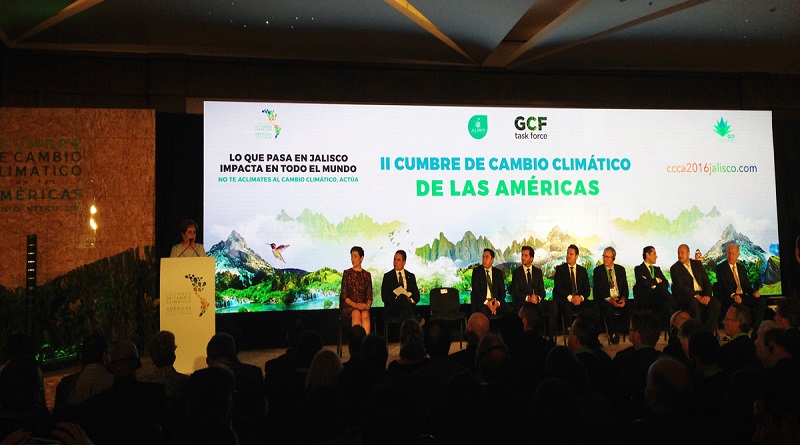Pan-American state, governments issue new climate action commitments
Leaders of Pan-American state and regional governments convened at the Climate Summit of the Americas today in Jalisco, Mexico, calling for swift ratification of the Paris Agreement on climate action while reaffirming their own commitment to addressing climate change.
These state and regional governments set out new avenues by which to drive forward their shared goal of a prosperous and thriving low carbon global economy.
The 2016 Climate Action Statement, issued today by participants at the Summit, urges their national counterparts to create the kind of policy environment that supports collaborative and supportive action on climate change. By making new commitments to boost renewable energy development, reduce deforestation, and enhance public greenhouse gas reporting, amongst the others listed below, state and regional governments demonstrated their commitment by undertaking one or more of these pledges to help build a prosperous and thriving net zero future by mid-century.
Commitments through the 2016 Climate Action Statement
By signing the Statement, sub-national governments are agreeing to commit to one or more of the listed initiatives, whilst pledging to work together with all actors to achieve net zero emissions by the second half of the century, and calling for an early and swift ratification of the Paris Agreement.
One of the key steps that state and regional governments are taking to enhance sectoral collaboration with businesses is supporting collaborative initiatives in the private sector like RE100. The 2016 Climate Action Statement includes a commitment to reinforce public-private partnerships and create the right policy environments for greater business investment in sustainable solutions and renewable energy.
CALL FOR EARLY RATIFICATION
The Paris Agreement, reached by 195 countries at the COP21 UN Climate Change Conference in December last year, calls for all levels of governments to “scale-up their efforts and support actions to reduce emissions and/or to build resilienceâ€. It is a critical component and in-line with the need for more urgent action to remain under 2 degrees Celsius.
Speaking at the Summit, Libby Ferguson, States & Regions Director at The Climate Group, said: “Questions linger on whether policy is being translated into practice and if action is being taken with the speed and vigor we need to off-set the major detriments of climate change. But across the Americas and around the world, states, regions and provinces are answering this question with accelerated and bold climate action.
“They are doing their part to reduce global emissions and build societies resilient to the effects of climate change, proving it can be done together with economic growth. In doing so, they ask national governments to do the same now.â€
Leaders from state and regional governments are continuing to make the case for ambitious action that will help countries meet the targets set with the Nationally Determined Contributions (NDCs) – the climate plans submitted last year in the build up to COP21.
Across the Americas and around the world, states, provinces and municipalities are answering this call, by continuing to set ambitious long-term emissions reduction targets, adopting policies that benefit both the environment and the economy, and making investments that will enable deep emissions reductions by 2050.
North American members of The Climate Group’s States & Regions Alliance have been setting great examples with their climate leadership. California and Québec created an economy-wide, legally binding emissions trading system, with Ontario due to join soon.
At the Summit, the two Canadian provinces have also committed to work with Mexico to further expand their carbon markets across their borders. This is another important step towards a pan-American solution to reduce emissions while reinvesting in adaptation to climate change and clean technologies.
Connecticut, New York and Vermont are among the nine state governments who formed the Regional Greenhouse Gas Initiative – the first market-based GHG regulatory program in the US. From adaptation and resilience, to renewable energy and energy efficiency measures, these governments are setting policies that are driving clean energy investment, building resilient communities, and reducing carbon emissions for sustainable economic development.
As a member of the States & Regions Alliance, and the convening state of the II Climate Summit of the Americas, Jalisco is on track to meet its 2018 target of increasing energy efficiency across regional government buildings and fleets by 12% (based on 2013 levels), whilst reducing emissions and providing large scale savings.
The Summit has also seen the participation of the UNFCCC Executive Secretary Patricia Espinosa, who has highlighted the crucial importance of collaboration between sub-national governments to tackle climate change on a global scale, and the economic opportunities of the inevitable low carbon economy.
“We are certain that there is only one possible global development plan,” she said, “and it is sustainable. All action to address climate change is an essential, inseparable and integrated part of that global development plan.”
After Paris, national governments have the responsibility to implement such path, she underlined, but they simply cannot do it by themselves: “Sub-national governments […] need to align local action with the Paris Agreement. Business, academic and civil society communities need to be active in the shift to a new kind of development.”
NORTH AMERICAN LEADERSHIP AT CLIMATE WEEK NYC
The conversations on climate action across the Americas – with a specific focus on the US and Canada – will continue at Climate Week NYC 2016, taking place on 19-25 September in New York City.
The next five to ten years will be crucial to ensure the world meets the targets set by the Paris Agreement. The actions taken by sub-national governments and the business sector across the United States and Canada in recent years have set a clear course for the North American region.
Key examples of climate leadership will be showcased at a series of high-profile events across New York City during the week, which will demonstrate how the collaboration between forward-thinking leaders is crucial to catalyze the net zero global economy mapped-out during the climate talks in Paris – both an economic opportunity and an environmental necessity.
North America has the financial mean and the political will to lead the world towards this irreversible path, and the collaborative space of Climate Week NYC will further incentivize the best practices and innovation required to turn the ambitious goals set out at COP21 into concrete actions.




